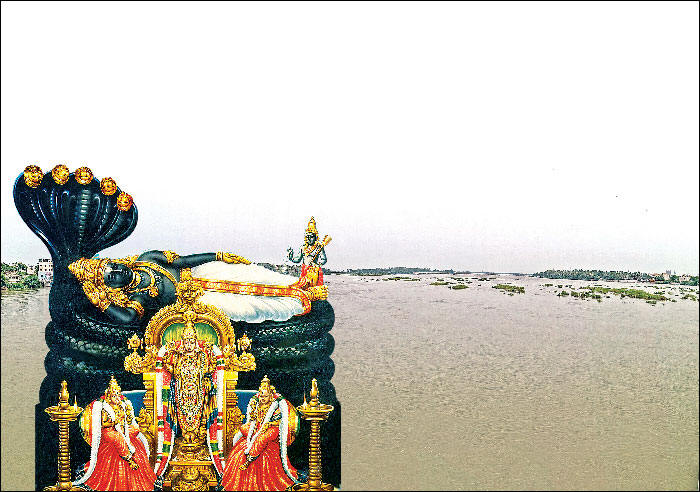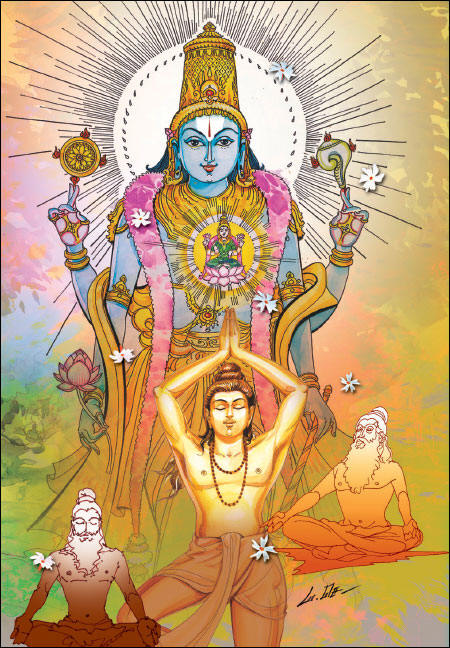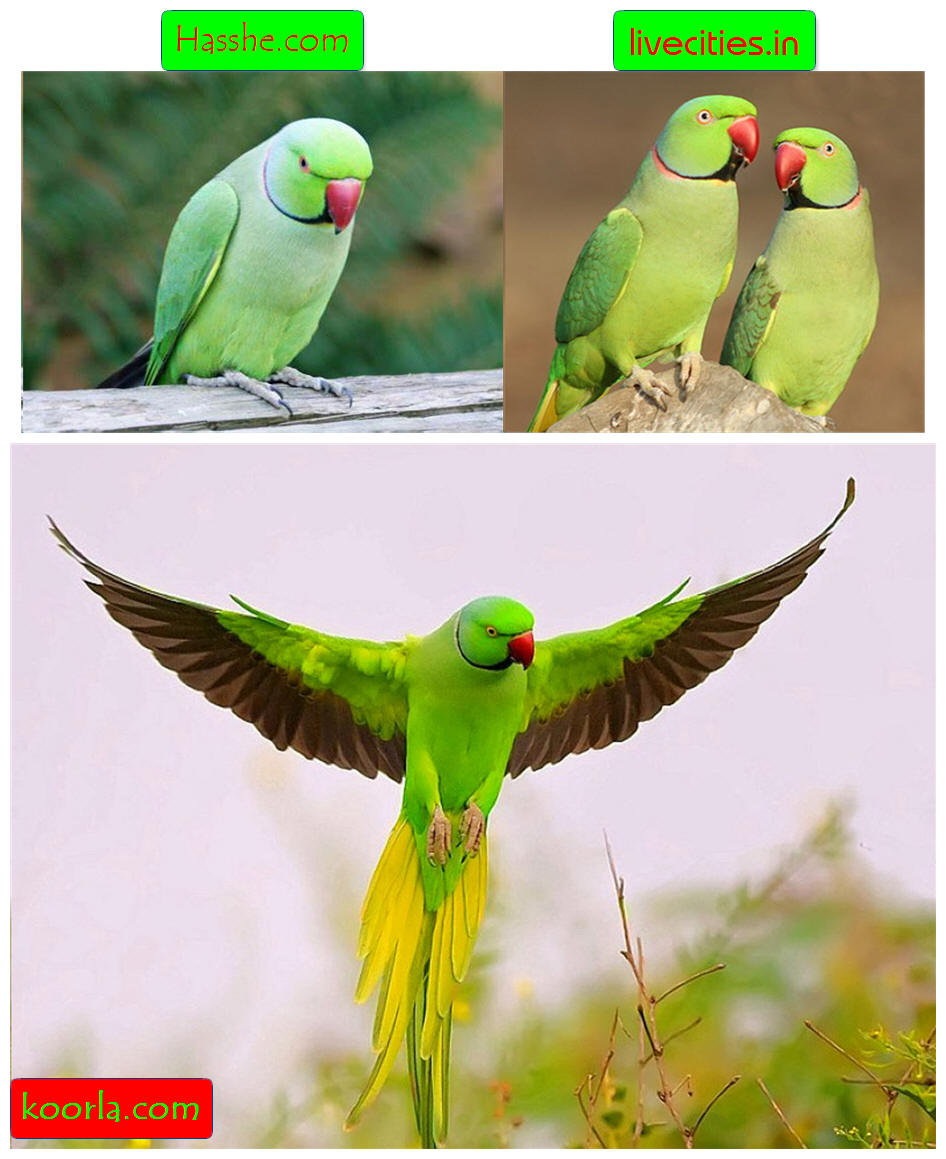Author: Indira Soundarrajan
Images and Photos: N.G.Manikandan
Revised November 13, 2018
Posted Date : 06:00 (25/09/2018) Sep 25, 2018. Sakthi Vikatan

Tiruvaraṅgam manifested. Praṇavākāra Perumal soon had a holy name, ‘Ranganathan.’
The Lord of the heavens came down to earth. In Ayodhya city, for multiple generations of kingly worships, inundation of his grace and blessings favored the kings and his subjects. Later, he reached the Island of Kaveri where the Chola Mandala subjects and their king contemplated on Emperuman and danced with the sense of Bakthi.
The place to dance is always Araṅgam (Dance Hall).
The reason for the ecstatic dance is Emperuman.
Since all the inhabitants performed the ecstatic dance, the island came to be known Araṅga Thīvu (Island with the Dance Hall). Later with a ‘Tiru’ (holy) prefix, it became Tiruvaraṅgam. Since Perumal flourished as the Lord of the Island Dance Hall, Praṇavākāra Perumal earned on this land the name, ‘Tiruvaraṅga Nāthar.’
He is the Lord of the world. This world came into being because of him. He is the ‘Head of the world,’ and so the holy name of Araṅganāthaṉ came about. The progeny of Dharmavarman protected Emperuman as the eyelid and eyelash would protect the eye and worshipped him. The time rolled on. In this cyclic time, it is the time for the era of the deluge.
In Vaikunta heaven Perumal and Perumāṭṭi (Lakshmi his consort) discussed the deluge. Perumāṭṭi worried about the deluge more than Perumal. Her speech reflected her concern.
Perumāṭṭi = Mahalakshmi: “Emperuman! What a catastrophe! The Great Deluge is here, it appears.”
Peruman: “Yes Devi! Since the creation of the Bhuloka and humanity, their maintenance and the creation of civilized society, multiple Manvantaras have passed. Because of it, multiple parts of the world suffer from drought, some parts suffer cold, and some others are afflicted with absent or diminished fertility. There is a background of the burden from sins and merits. Pralaya or deluge is the way and the act of cleansing.”
Perumāṭṭi: “Does Pralaya mean cleansing? Is it not great destruction or dissolution?”
Peruman: “Call it what you want. Great destruction, Pralayam (Great dissolution), Cleansing: they all mean the same thing.”
Perumāṭṭi: “Millions upon millions will die on this account.”
Peruman: “Why do you look at it as dissolution? Step out of your human nature and look at it. After dissolution, there will be a change and because of it, a change for the better.”
Perumāṭṭi: “Where is the need for this dissolution now?”
Peruman: “Kali Yuga is on the cusp of a new era. The creator must make some changes in this world. On this account, new mountains, rivers, new places, inorganic matter… will appear. Humanity will thrive.”
Perumāṭṭi: “For that humanity must not face extinction.”
Peruman: “Some will escape the deluge, Devi. With the help of their intellect, Guṇa, ability…they will establish their own country. The worshipful Ṛṣis and Munis will help humanity, offer worship to me and codify worship and homage to me for the benefit of the people. My grace will come to their aid.”
Perumāṭṭi: “What will become of your temple in Tiruvaraṅgam?”
Peruman: “For some time, it will be buried under the mud.”
Perumāṭṭi: “What a catastrophe?”
Peruman: “Where is the catastrophe here?”
Perumāṭṭi: “Incomparable golden Praṇavākāram buried in the mud? That too for eons! What am I to call it except a catastrophe?”
Peruman: “Devi! Just think how you appeared (came into being). The efforts, conflicts, fights, and ruins in the efforts of Devas and Asuras in the regenerative and ambrosial ocean made your appearance possible. Not that you are the only one coming from the ambrosial ocean. From Halāhala poison to Sañjīviṉi, the opposites appeared. The churning of the Milk Ocean is equal to Pralaya. If the Pralaya did not happen that day in the distant past, today, you will not be here and neither the Asuras besides others: Atsaya vessel, Kamadhenu, and Kaṛpaka Virutsam.
Perumāṭṭi: “Should they have been born of the churning of the ocean? Why can’t they be the instant products of your mental creation? You could have created me by the graceful mental will of yours. Why the churning?”
Peruman: “Mind creation will not show the time factor. Events are based on the time factor. History can be compiled from events only. From history, we can measure the dimension of time.”
Perumāṭṭi: “Will it explain the imminent Pralaya?”
Peruman: “Yes, for some time my form and Praṇavākāram will be enveloped and buried in Būmidevi’s mud. At a time in the future, my form will be discovered by a man or a woman and the worship will continue.
Perumāṭṭi: “Worship: it is just flattery. Is worship the best, Prabhu?”
Peruman: “Yes. Those with arrogance or conceit cannot offer worship. The first principle in worship is the absence of the feeling of ‘I.’ Worship helps humanity to live without arrogance. “
Perumāṭṭi: “Can anyone walk the great path without worship, Prabhu?”
Peruman: “Not possible, Devi.”
Perumāṭṭi: “Is conceit that serious?”
Peruman: “Conceit depletes Bakthi and encourages selfishness and self-glory.”
Perumāṭṭi: “Aren’t they like Asuras?”
Peruman: “You said it right. If the narrow and righteous path is missed, the result is demoniacal. The righteous path means control of the senses. Bakthi helps spirituality to grow. Self-conceit helps grow the demoniacal nature.”
Perumāṭṭi: “Wonderful explanation. You as the creator of wonders, the head of the world and Araṅganāthaṉ are great. As the night and day, people are demoniacal and human. I understand it. “
Lakshmi Devi became tender with emotion. Initially, she feared the deluge but came to know from Parantāmaṉ it is finality for the prospective new beginnings. Devi asked these questions on behalf of Dethe humanity. She received the answers from the horse’s mouth.
The time-bound Deluge resulting from the roar of the seas on one side and the inundation of the rivers on the other side made the Island of Tiruvaraṅgam which sank under the floods and disappeared out of sight.
Peruman in Yoga Nidra on Ādiśeṣa in the Milk Ocean moved the world screen to the sides and performed his Araṅkētṛṛam (Stage performance) on the world stage: His creation of the world and the Kaveri River, the island in the watery midst for some time, and the mud cover for some time.
Everywhere there was mud with no clues of the prior arrival and the present burial of the temple from the heavens to the earth. Tiruvaṅgam with seven streets and terraces was buried under the mud. As the witness of past existence of the temple in the form of rock cuts, tents or records by the elders, none existed. Time moved, though it appeared stagnant.

Dharmavarman’s progeny, during this devastation, continued to exist. So also, the Nīlivaṉam Ṛṣi progeny continued to live. Because of their deep Tapas, they had knowledge of their ancestors, and the Praṇavākāra Perumal aka Araṅganātha Perumal, whom they worshiped and extolled.
They learned of the burial history of Praṇavākāra Perumal. Araṅgam must be restored and surrounded with devotees. With those intents, they worshipped.
Worship is worship. The means and the path became apparent.
A Chola king in the lineage of Dharmavarman one day came to the riverside of Kaveri. The capital for his kingdom was Uraiyūr. He could not with certainty tell the name given to his kingdom by his ancestors.
The Kaveri river which swallowed Tiruvaraṅgam because of its floods bifurcated again as the double-stranded garland demarcating the island of Tiruvaraṅgam. The king jumped into the river, bathed, swam across to the shore of the island and stepped on the sacred land. The island invited him with open hands: the trees with luscious fruits, the floral gardens, the chirping birds, particularly the parrots.
The Chola king was exhilarated seeing the scenic beauty. The parroting of the birds was sweet as music to him. His body was tingling with ecstasy. He never felt like it. The chirping of the birds sounded like Mantras to him.

`காவேரி விரஜா ஸேயம் வைகுண்டம் ரங்கமந்திரம்
ஸ வாசுதேவோ ரங்கேச: ப்ரத்யட்சம் பரமம் பதம்
விமாநம் ப்ரணவாகாரம், வேதச்ருங்கம் மஹாத்புதம்
ஸ்ரீரங்கசாயீ பகவாந் ப்ரணவார்த்த ப்ரகாசக:'
It appeared the parrot sang a Mantra-poem. It sang it multiple times. The parrot sat on a mud hillock, flapped its wings and loosened the soil.
The king knew the import immediately. The priest accompanying him was connected to Nīlivaṉam. The priest understood the Slokam and elaborated on its meaning to the king.
The priest: “King! This is not an ordinary parrot. It is full of wisdom like Sukar Ṛṣipuruṣar. Among the birds, parrot and the crow are close to the people. The crow eats fire-cooked food like people. The parrot talks like the people.”
“The crow is black reminding us of the dead ancestors. The parrot sporting the green color of prosperity reminds us of the floral connection. The crow is Sani’s vehicle. The parrot reminds us of Emperuman’s green body like that of a green garland. Let me tell you the meaning of the parrot’s Sanskritic poem.”
In the Vaikuntam of Emperuman, Virajā river runs its course. Virajā River runs in the Vaikuntam as Kaveri does in Bhuloka. That is why this land we stand on is Bhuloka Vaikuntam. Likewise, Śrīraṅga Vimanam indicates Emperuman’s place in Vaikuntam. In it, he presents himself as Paramapathanāthaṉ, who blesses people in the name of Raṅganāthaṉ. That is the meaning of the poem.
Chola king was happy to hear it.
Chola king: “Kaveri is Virajā river, amazing. This place is Bhūlōka Vaikuntam. If that is so, where is the Śrīraṅga Vimanam in which abides Paramapatha Nāthaṉ.”
The king took the stirring of the mud by the parrot as an indicator and asked his minions to dig the area. Śrīraṅga Vimanam came into view. Next appeared Paramapatha Nāthar. Though they were buried for thousands of years, no stain or defect was detected.
Seeing them, he felt the exhilaration of his soul. That moment he was called Kiḷi (parrot) Cholan. Under his supervision, thousands of people joined and recovered the buried Tiruvaraṅgam.
Inordinate recovery! All seven Prakārams (circumambulatory paths) were dug up. They told us about the island’s society living in devotion and prosperity. In those days, our ancestors had such a high standard of living. Kiḷi Cholan thought to himself we should now have a higher standard of living.
Nīlivaṉa Ṛṣis, standing in the midst of excavation, narrated the story of Tiruvaraṅgam from the time of Vaisvata Manu to the time when the Deluge covered the Bhuloka Vaikuntam on the island. Kiḷi Cholan recorded their narratives on the palm leaves.
Bhuloka Vaikuntam with a new lease on life began its gracious reign again.
Will Continue.